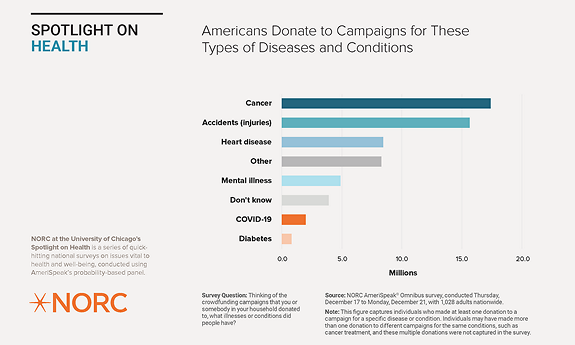Majority of Older Adults Experience Cyber Abuse in Their Lifetime
Four in ten older adults report someone attempting to deceive them into sending money or providing personal information online.
CHICAGO, November 22, 2021— About 63% of adults age 50 and older in the United States experience at least one form of cyber abuse in their lifetime, according to new research from NORC at the University of Chicago powered by Foresight 50+ by AARP and NORC.
There are many terms used to describe technology-facilitated abuse, including cyber abuse, cyberstalking, and cyberbullying. The main concept is when technology—like email, text messages, or social media—is used to harass, threaten, intimidate, humiliate, or defraud someone.
The NORC survey on cyber abuse follows a Federal Bureau of Investigation report showing that that 191,268 people age 50 or older lost a combined $1.8 billion in 2020 to internet fraud abuses. NORC research finds that older adults experience a great deal of cyber abuse in the form of extortion and fraud.
Financial threats are the most common type of threat older adults experience
Forty percent of older adults report someone attempting to deceive them into sending money or providing personal information. Twelve percent report someone attempting to gain access to their financial accounts, including bank account apps like Venmo or PayPal to monitor, defraud, or impersonate them.
“It is particularly concerning that so many older adults report some form of fraudulent scamming given the rise of financial and banking apps that can pave the way for scammers to prey on less tech-savvy victims,” said Elizabeth Mumford, principal research scientist at NORC and lead researcher of the Cyber-Abuse Research Initiative (CARI). “The growth in digital technology creates new threats and risks for older adults who may not have grown up in a digital environment.”
Among older adult victims of cyber abuse, 37% percent report being threatened financially.


Spotlight on Aging:
Percent of U.S. adults age 50 and older who say they have experienced various forms of cyber abuse
More older adults are joining social media and relying on online platforms for shopping, making them susceptible to fraud, scams, and security breaches. The survey finds 29% of older adults report someone using or attempting to use their personal information for a fraudulent purpose, including identity theft. Approximately one in ten older adults (11%) report someone accessing their online accounts or social media without their permission or knowledge.
Seventeen percent experience their cyber abuser sending them threatening, frightening, harassing, or aggressive messages using email, text, or social media. Another 12% say their name, address, contact information, social media profiles, or location were exposed to other people.
Overall, threats to cyber-abuse victims range from harm to an individuals’ reputation (19%) to more severe behaviors, such as physical harm (5%), damage to property (4%), or locating them in person (4%). Among victims of cyber abuse, nearly six in 10 older adults (59%) experience cyber abuse committed by strangers. For others, a spouse, family member, friend, or co-worker committed the cyber abuse.
NORC experts recommend taking action if older adults believe they are a victim of cyber abuse
Some older adults take action in response to cyber abuse. The most common action is to change their personal and financial credentials. Sixty-five percent of older cyber-abuse victims change their passwords, email addresses, phone numbers, or privacy or location settings. A third of older adults (33%) who are victims of cyber abuse change their financial accounts or freeze their credit. Only 23% of older cyber-abuse victims take both actions to change their passwords and financial accounts.
“If older adults believe they have been a victim of cyber abuse, step one is to immediately change passwords and any other security credentials they have in place to protect their assets and identity,” said Elizabeth Mumford. “In the most serious of cases, cyber-abuse victims can close down their financial accounts or place a freeze on their credit.”
Methodology
The self-funded poll was conducted between October 14 and 18, 2021, during a monthly Omnibus survey. It included 1,011 interviews with a nationally representative sample of adults age 50 and older (margin of error +/- 4.1 percent points). The AARP and NORC’s Foresight 50+ probability-based panel is designed to be representative of U.S. adults age 50 and older.
About the Spotlight on Aging
NORC at the University of Chicago’s Spotlight on Aging is a series of quick-hitting national surveys on issues vital to Americans age 50 and older, conducted using AARP-NORC’s Foresight 50+ Omnibus panel.
About NORC at the University of Chicago
NORC at the University of Chicago conducts research and analysis that decision-makers trust. As a nonpartisan research organization and a pioneer in measuring and understanding the world, we have studied almost every aspect of the human experience and every major news event for more than eight decades. Today, we partner with government, corporate, and nonprofit clients around the world to provide the objectivity and expertise necessary to inform the critical decisions facing society.
Contact: For more information, please contact Anna-Leigh Ong at NORC at ong-anna-leigh@norc.org or (917) 242-2172 (cell).





